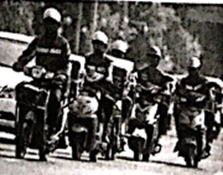阅读理解

Since the outbreak of COVID-19, in some cities Meituan has become almost 5 times as busy as usual. During the special period, the delivery drivers (外卖骑手) are busier and more tired than before. Without these drivers putting themselves at risk, families would go hungry and the sick wouldn't get necessary supplies.
Gao Zhixiao from Beijing, 32, a delivery driver who has continued working as the virus spread across China. Ever since the COVID-19 outbreak erupted in China, he has to take a health test each morning and spend about 20 minutes disinfecting (消毒) his motorcycle and clothes to avoid spreading germs during his route.
"After I gave her medicine, I stayed to talk to her," he says. "Because I am also from a single-parent family, I understand what it means to an old. She said that she hadn't eaten yet, because it was difficult to find food during the epidemic. So I made her instant noodles and two poached eggs, then took the trash out when I left. "
Li Fengjie is another delivery driver in Wuhan, who was born in 1996. He felt nervous when he heard the news about COVID-19. He took things a few steps further. As a Meituan rider in Wuhan, the capital of Hubei province, where the COVID-19 epidemic first erupted in late December, he knew that his services would be essential (必备) after the city of 11 million was locked down on Jan 23. Li walked 50 kilometers to get to work after all public transport was halted.
"I felt a sense of responsibility because I manage a team of other riders, and some were still working in Wuhan, so I had to help them, "he says. "All the doctors and nurses are coming to Wuhan to help, so we, the riders, should also fight with them on the frontline. "
The great news is that Li Jie, who is a common delivery rider in Beijing, attended the meeting about COVID-19 prevention on March 9th 2020. That means all the people must understand and respect the delivery riders. We all hope that they can receive better training and working conditions, have more job opportunities and career development for riders in the future.